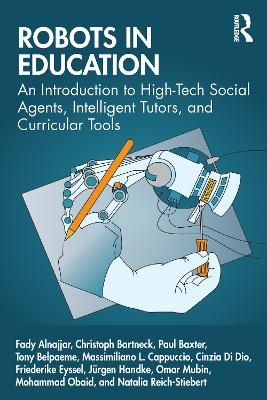
Robots in Education
Routledge (Verlag)
978-0-367-65539-6 (ISBN)
Fady Alnajjar is Associate Professor in the Department of Computer Science and Software Engineering in the College of Information Technology at United Arab Emirates University, UAE. Christoph Bartneck is Associate Professor and Director of Postgraduate Studies in the HIT Lab NZ at the University of Canterbury, New Zealand. Paul Baxter is Senior Lecturer in Computer Science (Autonomous Systems) and Founding and Steering Group member of the Autism Research and Innovation Centre (ARIC) at the University of Lincoln, UK. Tony Belpaeme is Professor in the Faculty of Engineering and Architecture at Ghent University, Belgium, and Full Professor in Cognitive Systems and Robotics at Plymouth University, UK. Massimiliano L. Cappuccio is Senior Researcher in the School of Engineering and Information Technology at the University of New South Wales Canberra, Australia. Cinzia Di Dio is Researcher in the Faculty of Education in the Department of Psychology at Università Cattolica del Sacro Cuore, Italy. Friederike Eyssel is Full Professor and Head of the Applied Social Psychology and Gender Research Lab at Bielefeld University, Germany. Jürgen Handke is Professor in the Department of English and American Studies at the Philipps University of Marburg, Germany. Omar Mubin is Senior Lecturer in Human Computer Interaction in the School of Computer, Data, and Mathematical Sciences at Western Sydney University, Australia. Mohammad Obaid is Associate Professor of Human-Computer Interaction and Head of the Interaction Design Unit in the Department of Computer Science and Engineering at Chalmers University of Technology, Sweden. Natalia Reich-Stiebert is Research Fellow at the Department of Social Psychology at the University of Hagen, Germany.
1. Introduction 2. Theories of Learning 3. The Interactive Mind 4. What Makes a Robot? 5. The Robot as a Tool 6. The Robot as a Social Agent 7. Deployment Requirements 8. Applications 9. Attitudes Towards Robots 10. Ethics 11. Research Methods in Educational Robotics
| Erscheinungsdatum | 02.08.2021 |
|---|---|
| Zusatzinfo | 1 Tables, black and white; 2 Line drawings, black and white; 47 Halftones, black and white; 49 Illustrations, black and white |
| Verlagsort | London |
| Sprache | englisch |
| Maße | 152 x 229 mm |
| Gewicht | 340 g |
| Themenwelt | Schulbuch / Wörterbuch ► Unterrichtsvorbereitung ► Unterrichts-Handreichungen |
| Informatik ► Theorie / Studium ► Künstliche Intelligenz / Robotik | |
| Sozialwissenschaften ► Pädagogik ► Allgemeines / Lexika | |
| Sozialwissenschaften ► Pädagogik ► Bildungstheorie | |
| ISBN-10 | 0-367-65539-X / 036765539X |
| ISBN-13 | 978-0-367-65539-6 / 9780367655396 |
| Zustand | Neuware |
| Informationen gemäß Produktsicherheitsverordnung (GPSR) | |
| Haben Sie eine Frage zum Produkt? |
aus dem Bereich


